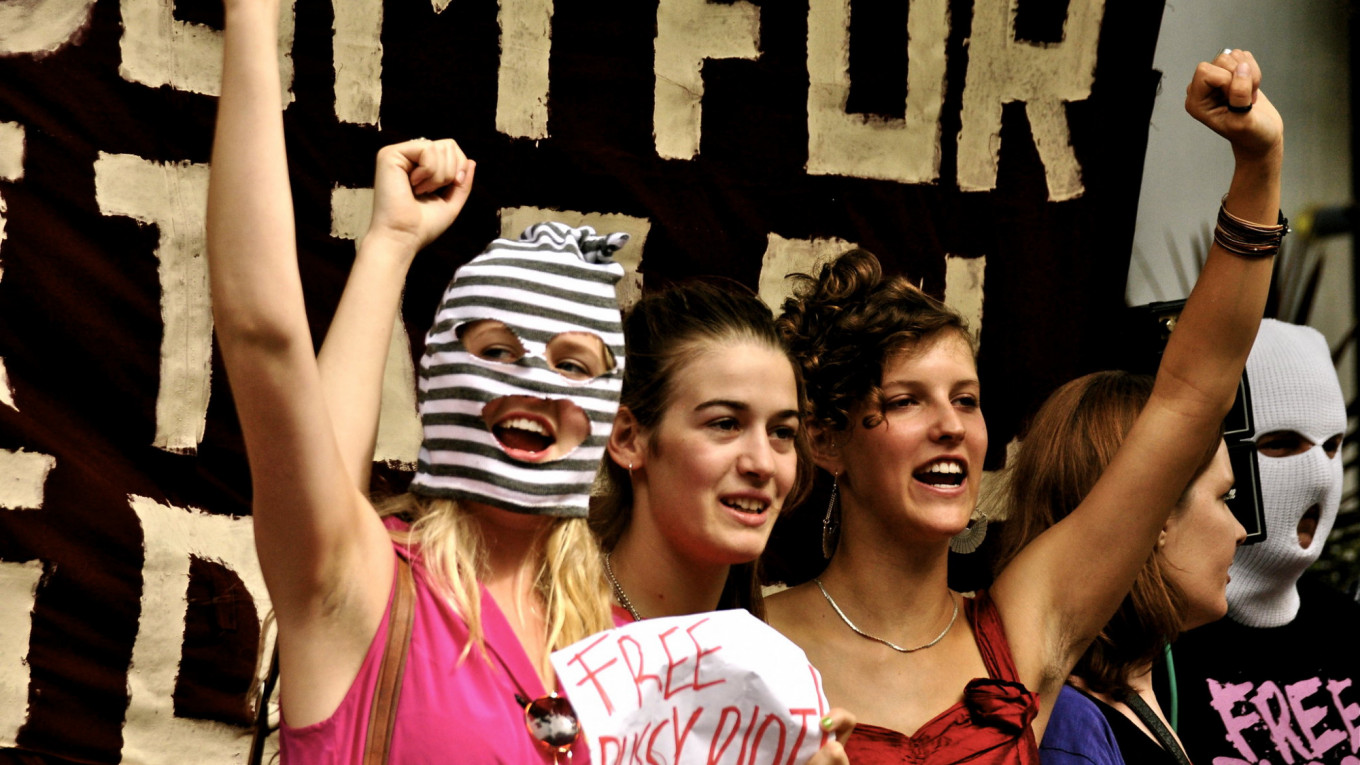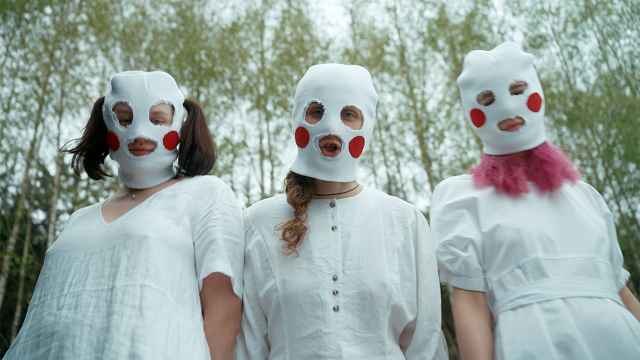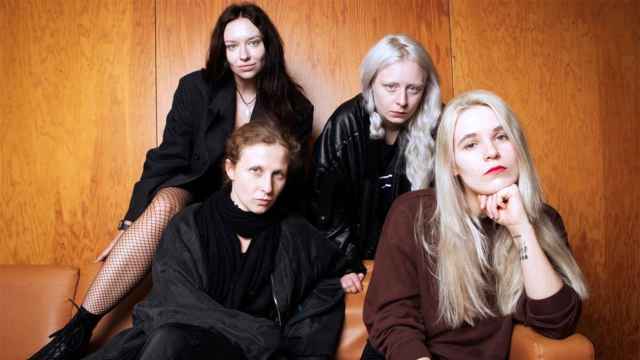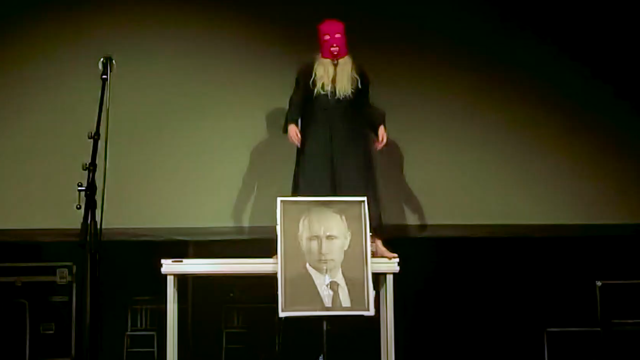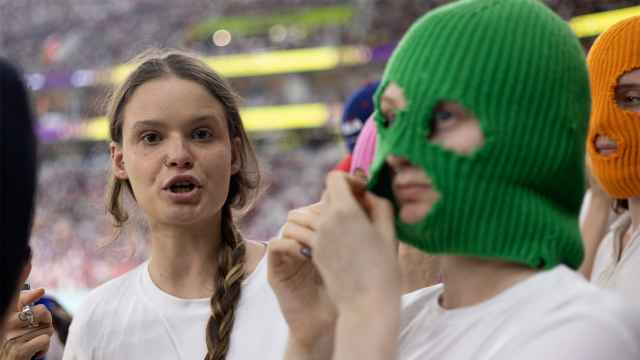Russian authorities on Thursday jailed Pussy Riot member Rita Flores for 15 days on charges of disobeying police, an arrest the group said was for “no damn reason.”
Flores’ arrest is the most recent in a growing string of detentions, self-imposed exiles and jail sentences against members of the collective in 2021.
Here’s what you need to know:
What is Pussy Riot?
Pussy Riot is commonly described as a feminist punk rock and performance art collective. The group was founded in 2011 by Nadezhda Tolokonnikova and Yekaterina Samutsevich, both of whom were members of Voina (“War”), another politically charged activist group with an emphasis on public performance.
They rose to international prominence with their now-infamous 2012 “punk prayer” in a Moscow cathedral criticizing President Vladimir Putin’s ties to the Russian Orthodox Church. Tolokonnikova and fellow member Maria Alyokhina would be sentenced to two years in prison over the performance.
Since then, the group has continued to stage provocative guerrilla performances, including crashing the 2018 football World Cup final to protest “political arrests” and Russia’s lack of political competition.
With over 375,000 monthly listeners on Spotify, Pussy Riot is also known for its hard-hitting music, with its first public demonstration being an interruption of a lecture on feminist punk with its song “Ubey seksista” (“Kill the Sexist”).
Who is in Pussy Riot?
Pussy Riot is more of a loose collective than a defined group, with membership typically ranging from three to 11 women at any given time.
Co-founder Tolokonnikova has described the group as “not a music band, it’s a movement,” and that “[there] are a lot of people who are just involved from time to time doing political action under the name of Pussy Riot. It’s truly a membership of dozens of people.”
Why are members being jailed now?
Veteran Pussy Riot member Alyokhina, along with Victoria Narakhsa and Moscow municipal deputy Lucy Shtein, were among the thousands of Russians nationwide detained while protesting for Alexei Navalny’s release on Jan. 23. Alyokhina was fined 30,000 rubles ($400) while the other two were sentenced to 10 days in jail.
Shtein and Alyokhina are among the 10 opposition figures criminally charged with “inciting mass violations” of coronavirus restrictions by calling on supporters to attend the Navalny protests. The two have been under house arrest since February and face up to two years in prison on the charges.
Ahead of Russia’s Victory Day holiday on May 9, member Veronika Nikulshina was detained near her home on suspicion of disobeying police. Interfax cited the reason for her detention as “to prevent possible provocations during rehearsals” for the May 9 military parade on Red Square.
In late June, Nikulshina would be detained a second time on what her lawyer said was suspicion of planning to disrupt the Euro 2020 football championship in St. Petersburg, similar to how she ran onto the pitch during the World Cup final in 2018. She was charged with disobeying police orders and sentenced to two consecutive 15-day jail terms.
Also in late June, Alyokhina, Shtein, Alexander Sofeyev and Anna Kuzminykh were detained and sentenced to 15 days of arrest for charges including petty hooliganism and disobeying police orders.
All of the members maintain their innocence and say they’re being targeted because of their affiliation with Pussy Riot.
The arrests are part of what Kremlin critics and analysts say is an attempt by the authorities to stifle opposition activity in the run-up to September’s high-stakes parliamentary elections.
Which members have left Russia?
Several Pussy Riot members have left the country or voiced their intent to leave in recent days, citing fears of persecution.
Sofeyev left Russia on Monday, telling the Open Media news website prior to his departure that he was leaving due to the ongoing political “persecution” of the group’s members. He added that he hadn’t emigrated and plans to return to Russia in the near future. Kuzminykh left Russia the same day after being released from arrest.
Nikulshina fled Russia for Georgia immediately after being released from her two consecutive 15-day jail terms on July 17. She told the independent Dozhd broadcaster that she plans to return to Russia.
A Message from The Moscow Times:
Dear readers,
We are facing unprecedented challenges. Russia's Prosecutor General's Office has designated The Moscow Times as an "undesirable" organization, criminalizing our work and putting our staff at risk of prosecution. This follows our earlier unjust labeling as a "foreign agent."
These actions are direct attempts to silence independent journalism in Russia. The authorities claim our work "discredits the decisions of the Russian leadership." We see things differently: we strive to provide accurate, unbiased reporting on Russia.
We, the journalists of The Moscow Times, refuse to be silenced. But to continue our work, we need your help.
Your support, no matter how small, makes a world of difference. If you can, please support us monthly starting from just $2. It's quick to set up, and every contribution makes a significant impact.
By supporting The Moscow Times, you're defending open, independent journalism in the face of repression. Thank you for standing with us.
Remind me later.


